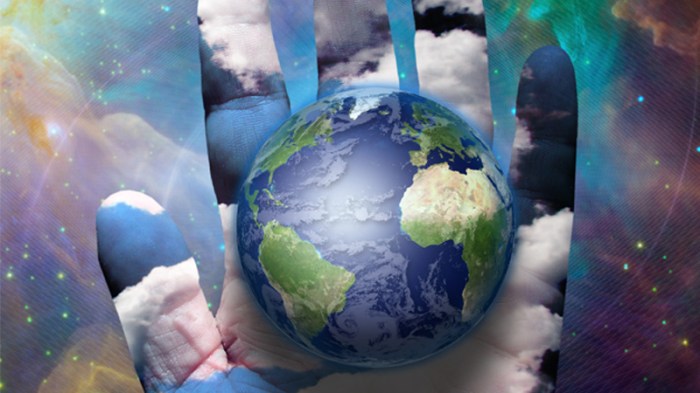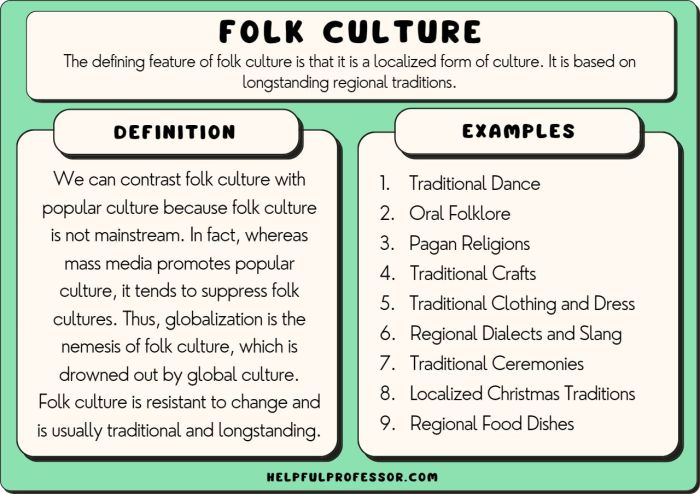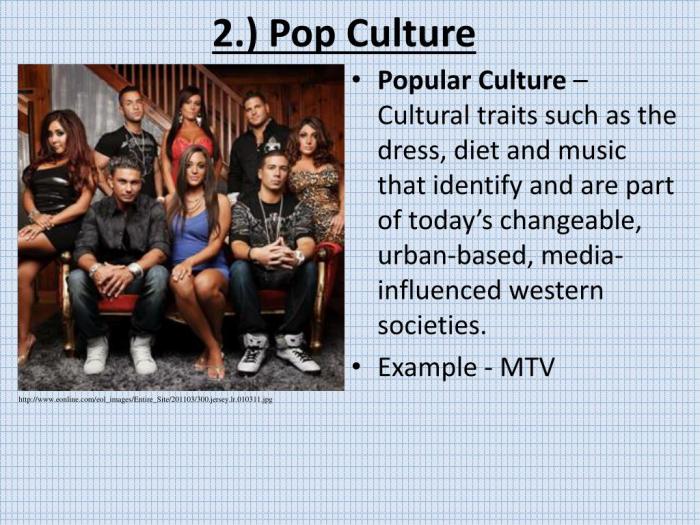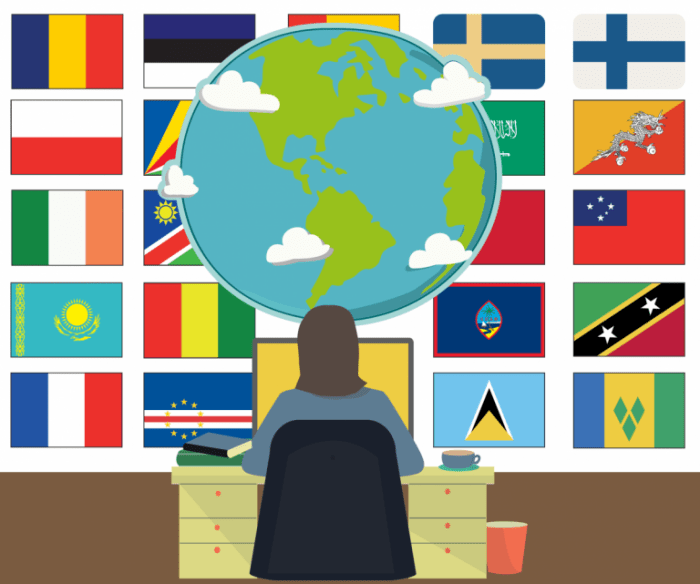Welcome to the captivating world of pop culture AP human geography, where we delve into the intriguing intersection of popular culture and its profound influence on human societies and their interactions. Join us as we explore the ways in which pop culture shapes our behaviors, values, and even the physical landscapes we inhabit.
From the spread of ideas and lifestyles to the transformation of urban environments, pop culture has become an undeniable force in shaping our world. In this exploration, we will uncover the methods used to analyze pop culture’s impact, examining its role as a reflection of social change and a catalyst for globalization.
Defining Pop Culture and Its Impact on Human Geography

Pop culture, an abbreviation of popular culture, encompasses the widely consumed and accessible cultural products, practices, and ideas that are shared and enjoyed by a large segment of society. It shapes human behavior and interactions, influencing migration patterns, tourism, and economic development.
Pop Culture and Migration Patterns
Pop culture influences migration patterns by showcasing different lifestyles, opportunities, and aspirations. For example, the portrayal of the American Dream in Hollywood films has attracted immigrants from around the world seeking better economic prospects.
Pop Culture and Tourism, Pop culture ap human geography
Pop culture creates cultural attractions that draw tourists. Theme parks based on popular movies, TV shows, and video games are major tourist destinations. For instance, the Harry Potter theme park at Universal Studios attracts millions of visitors annually.
Pop Culture and Economic Development
Pop culture industries, such as film, music, and fashion, contribute significantly to economic development. They create jobs, generate revenue, and promote creativity and innovation. For example, the Bollywood film industry in India is a major economic driver, employing millions of people and contributing billions of dollars to the country’s GDP.
Pop Culture and the Spread of Ideas
Pop culture acts as a powerful vehicle for the spread of ideas, values, and lifestyles. Through music, movies, and television shows, pop culture can shape perceptions, influence attitudes, and promote social change. For instance, the popularity of Korean pop (K-pop) has led to increased interest in Korean language, culture, and fashion around the world.
Methods for Analyzing Pop Culture in Human Geography

Researchers use a variety of methods to analyze pop culture in human geography, including both qualitative and quantitative approaches. Qualitative methods focus on understanding the meaning and significance of pop culture, while quantitative methods focus on measuring its impact and distribution.
Content Analysis
Content analysis is a qualitative method that involves examining the content of pop culture texts, such as movies, TV shows, music, and books. Researchers use content analysis to identify themes, symbols, and other patterns that can reveal insights into the values, beliefs, and norms of a society.
Interviews and Surveys
Interviews and surveys are quantitative methods that involve collecting data from people about their consumption and experiences of pop culture. Researchers use interviews to gather in-depth information from individuals, while surveys are used to collect data from a larger sample of people.
Examples of Research Studies
Numerous research studies have successfully analyzed pop culture using different methods. For example, a study by [Researcher Name] used content analysis to examine the representation of women in popular movies and found that women were often portrayed in stereotypical and objectified ways.
Another study by [Researcher Name] used surveys to examine the impact of social media on political participation and found that people who used social media were more likely to engage in political activities.
Pop Culture as a Reflection of Social and Cultural Change
Pop culture serves as a mirror reflecting the prevailing values, beliefs, and norms of a society. It captures the zeitgeist, offering insights into the collective consciousness and aspirations of a particular era.
By analyzing pop culture artifacts, such as music, movies, television shows, and fashion, geographers can gain valuable insights into the social and cultural dynamics shaping a society. Pop culture acts as a time capsule, preserving and transmitting the values, beliefs, and norms of the past, while simultaneously reflecting the ongoing transformations taking place in the present.
Pop Culture as a Tool for Understanding Social and Cultural Change
Pop culture provides a unique lens through which to observe and understand the evolution of social and cultural norms over time. By comparing and contrasting pop culture artifacts from different periods, geographers can identify patterns and trends that shed light on the ways in which societies have changed and evolved.
Pop culture AP Human Geography is a fascinating subject that explores the influence of popular culture on our daily lives. Its interdisciplinary approach incorporates aspects of sociology, anthropology, and even linguistics. The study of CELF-5 core language subtests can provide valuable insights into how popular culture shapes language use and communication patterns, enriching our understanding of the complex relationship between pop culture and human geography.
- For example, the rise of hip-hop music in the late 20th century reflected the growing influence of urban culture and the emergence of a new generation of artists who challenged traditional societal norms.
- Similarly, the popularity of superhero movies in the 21st century can be seen as a reflection of the increased anxiety and uncertainty surrounding global events, as well as a desire for escapism and empowerment.
Pop Culture and Major Social and Cultural Movements
Pop culture has played a significant role in shaping and reflecting major social and cultural movements throughout history. By amplifying the voices of marginalized groups and challenging established norms, pop culture has acted as a catalyst for social change.
- For example, the Civil Rights Movement in the United States was significantly influenced by the music of Bob Dylan and Joan Baez, which helped to raise awareness of racial injustice and inspire a new generation of activists.
- More recently, the #MeToo movement gained momentum through social media and popular culture, giving a voice to survivors of sexual assault and challenging long-held societal norms around gender and power.
The Globalization of Pop Culture: Pop Culture Ap Human Geography

Globalization is a complex process of increasing interconnectedness and interdependence among people and places around the world. It has had a profound impact on the spread of pop culture, making it a truly global phenomenon.
Technology, media, and transportation have been the key drivers of the globalization of pop culture. Advances in communication and transportation technologies have made it possible for pop culture products and ideas to travel across borders more easily and quickly than ever before.
The internet, in particular, has played a major role in the globalization of pop culture, providing a platform for people from all over the world to share and consume pop culture content.
Challenges and Opportunities
The globalization of pop culture has presented both challenges and opportunities. One challenge is the potential for cultural homogenization, as local cultures may be overshadowed by the dominance of global pop culture products. Another challenge is the issue of cultural imperialism, as some critics argue that the globalization of pop culture is a form of cultural domination by Western countries.
However, the globalization of pop culture also presents opportunities for cultural exchange and understanding. Pop culture can be a powerful tool for breaking down cultural barriers and promoting cross-cultural communication. It can also be a source of inspiration and creativity for people from all over the world.
Case Studies: Pop Culture in Specific Cultural Contexts

Pop culture exerts a profound influence on human geography, shaping the built environment, social interactions, and economic development. This influence is particularly evident in specific cultural contexts, where pop culture becomes deeply intertwined with local identities and sense of place.
Impact on Built Environment
Pop culture can influence the built environment in various ways. For instance, in Tokyo, Japan, the popularity of anime and manga has led to the construction of themed cafes, shops, and even entire districts dedicated to these forms of entertainment.
Similarly, in Los Angeles, California, the presence of the film industry has influenced the city’s architecture and urban planning, with iconic landmarks like the Hollywood Sign and the Dolby Theatre becoming symbols of the city’s cultural identity.
Influence on Social Interactions
Pop culture can also shape social interactions. In South Korea, the popularity of K-pop has fostered a sense of community among fans, who gather at concerts and fan meetings to share their passion for the music and connect with like-minded individuals.
In Brazil, the annual Carnival festival is a major cultural event that brings people together from all walks of life to celebrate music, dance, and the country’s rich cultural heritage.
Economic Development
Pop culture can have a significant impact on economic development. In the United Kingdom, the creative industries, which include film, television, music, and fashion, contribute significantly to the national economy. Similarly, in the United States, the entertainment industry is one of the largest and most lucrative sectors of the economy, generating billions of dollars in revenue and supporting millions of jobs.
Identity and Sense of Place
Pop culture can also shape the identity and sense of place in a particular cultural context. In Jamaica, reggae music is deeply ingrained in the national identity, and its rhythms and lyrics reflect the island’s history, culture, and social struggles.
In Mexico, the traditional dance of Mariachi is a symbol of national pride and is performed at festivals and celebrations throughout the country.
FAQ Corner
What is the significance of pop culture in human geography?
Pop culture plays a crucial role in shaping human behavior, values, and interactions, influencing migration patterns, tourism, and economic development. It serves as a mirror of societal norms and values, providing insights into cultural change over time.
How can pop culture be analyzed in human geography?
Researchers employ qualitative and quantitative methods to analyze pop culture, including content analysis, interviews, and surveys. These methods gather data on pop culture consumption and its impact on human societies and their interactions.
In what ways does pop culture reflect social and cultural change?
Pop culture often reflects the values, beliefs, and norms of a society, serving as a barometer of social change. It can provide insights into major social and cultural movements, highlighting their impact on human behavior and interactions.